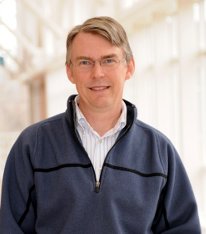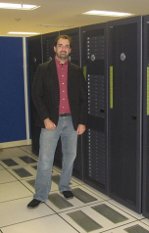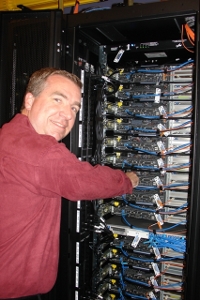Second in a series of four articles about the TeraGrid
 Navajo Technical College in New Mexico is a small tribal school hardly flush with research computing equipment, said Jason Arviso, director of the information technology office and National Science Foundation Science, Technology, Engineering, and Mathematics (STEM) grant program at Navajo Technical. Conversely, Clemson University in South Carolina went from zero to nearly 50 teraflops and the Top 500 supercomputers list in a few short months. "I know that eventually we won't have enough nodes for everybody," said Barr von Oehsen, director of computational science in the Cyberinfrastructure Technology Integration Group at Clemson.
Navajo Technical College in New Mexico is a small tribal school hardly flush with research computing equipment, said Jason Arviso, director of the information technology office and National Science Foundation Science, Technology, Engineering, and Mathematics (STEM) grant program at Navajo Technical. Conversely, Clemson University in South Carolina went from zero to nearly 50 teraflops and the Top 500 supercomputers list in a few short months. "I know that eventually we won't have enough nodes for everybody," said Barr von Oehsen, director of computational science in the Cyberinfrastructure Technology Integration Group at Clemson.

Campus Champions is designed to expand and diversify the TeraGrid's user base by recruiting local evangelists on campuses nationwide. From oneat the University of Kentuckywhen the program began in March 2008, the number of champion institutions has ramped up steadily to 38 spread from South Carolina to Hawaii and Alaska to Louisiana.
The champions will get together at the TeraGrid annual conference, June 22-25 in Arlington, Virginia to learn more about TeraGrid and share strategies and opportunities with their Campus Champions colleagues.
The idea for Campus Champions stemmed from community desire to foster an on-going working relationship among TeraGrid and campuses across the country. "The program is modeled on outreach efforts conducted by NSF national supercomputing centers years ago," said Scott Lathrop, area director for education, outreach, and training for the TeraGrid. Kay Hunt, customer service manager of the Rosen Center for Advanced Computing at Purdue University in Indiana, is leading the effort. "Our initial plan was to engage on the order of a dozen campuses during the first year," Lathrop said. He said the ultimate goal is to have at least one champion in every state, the U.S. Virgin Islands, and Puerto Rico and more as the interest and demand warrant to best serve campus researchers, educators, and students. Moreover, the effort is intended to reach not only traditional research institutions, but also minority serving institutions (MSIs) and Experimental Program to Stimulate Competitive Research (EPSCoR) schools.
In Arkansas, senior Linux cluster administrator Jeff Pummill, who serves as the campus champion at the University of Arkansas in Fayetteville, said he and colleagues are now helping other schools in the state and regionally take advantage of the TeraGrid.

"Most places do not have infrastructure for even a single large cluster," Pummill said. "The ideal solution is the TeraGrid. What better opportunity for free compute cycles could you possibly have?"
"The Campus Champions are forming a virtual organization for sharing experiences, challenges, and successes engaging their local community and helping TeraGrid to improve its services for the research and education community," Lathrop said. "That's a tremendous win-win situation."
Hunt said the campus champions range from those with interest, but little experience, in high performance computing and the TeraGrid, to experienced systems administrators. No particular expertise is required, just a willingness to learn and a desire to spread that knowledge.
Among other things, the champions receive a TeraGrid start-up account they can use to explore the better to assist researchers on their campuses and an allocation of compute time they can parcel out to get their faculty, post-docs and students started right away. Besides compute time, the researchers also gain access to applications software on the TeraGrid that may not be available on their campuses.
Kentucky had been working for several years to get more people on its campus involved in high-performance computing when the champions program came along, said Barbara Kucera, deputy director of the university's Center for Computational Sciences, who was instrumental in getting the school involved with Campus Champions.
"Now we can tell someone if you want to port your code, there's no reason to be frightened, because we have somebody to hold your hand and there are plenty of cycles available," said Kucera, who also serves as a Campus Champions Advisory Board member.
That the assistance is likely to come from somebody with a familiar face is an advantage as well. "The customer is far more comfortable talking to me because in most cases they know me on a first-name basis," said Roger Moye, Linux cluster administrator in the Research Computing Support Group and a campus champion at Rice University in Texas.

Nurit Haspel, a post-doctoral researcher in computational structural biology at Rice, said the TeraGrid and Campus Champions have enabled her to accelerate her research into protein conformation and functionality by a great deal.
"The help of the TeraGrid champions has been invaluable, both in writing and submitting the application of allocation and, later, in resolving specific issues with software installation and a close follow-up on my progress," she said.
The champions themselves get access to a variety of training and support systems, including online tutorials, monthly teleconferences, and periodic in-person workshops. They are also invited to become members of the TeraGrid user services team, spreading tips, tricks, and solutions to common problems.
"Everybody on the TeraGrid seems to want to jump in and help," Pummill said. "All the people are very approachable."
University of Washington Campus Champion Jeff Gardner helped colleague Eric Shea-Brown, assistant professor in the Applied Math department, by allowing use of his TeraGrid allocation. Shea-Brown said, "The TeraGrid has been an extraordinary resource for our theoretical neuroscience research group. There is no way we could have answered the questions at hand without it. We processed 5000 hours of Monte-Carlo simulations in one evening, which was just in time for our needs! We may not have gotten started without Gardner's help. The Campus Champions program is brilliant. I could not imagine a better use of NSF resources."
More information: Campus Champions and TeraGrid
Greg Kline is a science and technology writer for Information Technology at Purdue (ITaP) and can be reached at: kline (a t) purdue (d o t) edu


